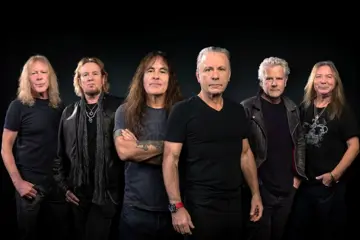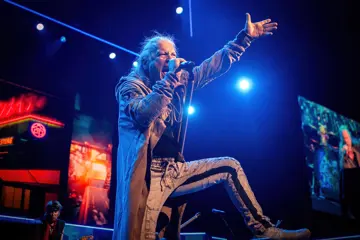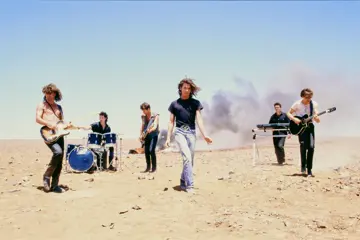Emma Bosworth (Green Music Australia):
What is the impact of music on the environment that people might not be aware of?
Through the work that we've done, some of the biggest "take homes" have been:
For a concert or festival, audience vehicle travel emissions far outweighs the flights of travelling musicians and their crew.
Campsite waste accounts for 50 to 70 percent of a camping festival’s total waste.
Venues are spending a lot of money on energy, and very few have solar on their roof or efficient equipment – it’s not hard to make buildings more airtight and change fridge seals.
Lots of senior music business staff do loads of air travel, aren't offsetting, and rarely have a staff travel policy.
So many venues and festivals are using disposable "biodegradable" cups, and they're really not much better than plastic. I estimate there would be at least one to two million single-use cups going to landfill from music events in Brisbane every year.
What can be done on a large scale to help mitigate the issues?
There are definitely some legislation changes that would fix a bunch of problems, like banning all disposable cups from permanent venues or introducing strict product stewardship laws to ensure retailers only stock quality festival camping gear. Then of course there’s government investment in things like public transport and cycling paths to get people out of their cars. Of course, for any of this to happen we need to pressure our pollies – that’s why Green Music runs advocacy campaigns at election time.
I'd also like to see landlords step up and help small businesses make improvements to their buildings and equipment. At the end of the day, the planet is everyone's responsibility and we don't have time to wait to be told what to do. Businesses need to prioritise the planet before storms and fires cancel every outdoor gig, and it costs too much to keep venues cool. Start small, and don't aim for perfection. Consult with your stakeholders about what matters to them in terms of your environmental performance (your audience, board members, executives, major partners), create a plan, and get cracking.
What can be done on a smaller scale to help mitigate the issue?
Pick one problem, and fix it forever. This could be changing to an ethical bank, buying 100 percent green power, buying all local beverages for your bar, having a green rider, banning single use coffee cups and water bottles on your tour or in your office, using an ethical ticketing company, doing an all-staff or all-band volunteer day for your local landcare group. And most importantly, don’t forget whose land we are occupying and become a First Nations ally.
What is Green Music Australia? Give us your elevator pitch.
Don't miss a beat with our FREE daily newsletter
Green Music Australia is a globally recognised non-profit leading change in the music scene. We've partnered with high profile artists like Midnight Oil, Missy Higgins, Paul Kelly, Montaigne and Jack Johnson to create new models for sustainable touring; launched the world’s first Music Climate Declaration; unfurled a 20ft “Coral Not Coal'' banner at Bluesfest; supported major business to divest from fossil fuels; and created an international #BYOBottle movement, assisting over 40 festivals to move towards Zero Waste and save 3 million plastic cups and bottles. This is just the start.
Edwina Floch (The Environmental Music Prize):
What is the impact of music on the environment that people might not be aware of?
Pop culture attracts and distracts, but it also provides us with a great opportunity to educate and inspire.
Artists and bands are adored and trusted influencers (they are also collectively the most followed public figures on social media in Australia), so shining light on those that are using their platform as a force for good and empowering new voices to use their influence strategically, could help create a massive cultural shift that makes climate action cool and removes the social license of big polluters.
What can be done on a large scale to help mitigate the issues?
There are some amazing initiatives taking shape to make concerts and festivals more sustainable, but a lot of the impact is driven by audiences' transportation needs. Better outcomes could be achieved if big stadiums and events collaborated more closely with councils and even state transport authorities. Green Music is doing great advocacy in this space and a few years ago Massive Attack worked with the Tyndall Centre for Climate Change to demonstrate how cities could better innovate.
I think it's a great way to get local businesses involved as they will be excited to share how they are contributing to make the popular events their customers attend more eco-friendly.
What can be done on a smaller scale to help mitigate the issue?
We’re all a bit overwhelmed by the enormity of the issue and the number of things we should be doing. Try not to get paralyzed by perfection and focus first on areas of biggest impact. Vote for clear policies that get us to net zero faster. It's the biggest accelerator for people and businesses making decisions. Make your money a force for good. There are lots of great banking, super and consumer products to choose from.
Use your voice. We all have a community and some type of influence… be the person in your building or office that suggests installing rooftop solar, invite your friends to a plant-based dinner, get educated and share interesting insights with others. If you’d like to learn how you can use your voice, please join our upcoming free ‘Music Conservation Leadership Workshop co-hosted by The Wilderness Society’.
What is the Environmental Music Prize? Give us your elevator pitch.
The Environmental Music Prize is a global first that amplifies the voices of artists who inspire action for climate and conservation. It incentivises talented musicians to create powerful music videos that connect us to nature and empowers these influential cultural icons to become advocates for rapid change.
In 2022 and 2023, the finalists selected by environmental leaders and music ambassadors included Midnight Oil, Flume, Tash Sultana, King Stingray, Jack River, Mo’Ju, Paul Kelly, Briggs, Lime Cordiale, Emily Wurramara and In Hearts Wake.
The initiative has been internationally recognised with former UN Climate Chief Christiana Figueres encouraging her global audience to watch, listen and share. People from 59 countries voted for the songs that resonated and most excitingly, the publicly-voted winners in 2022 (King Gizzard And The Wizard Lizard) and 2023 (Xavier Rudd) both donated their $20,000 prizes to environmental organisations they admire.
If you believe in the power of music to move and connect, please consider supporting the crowdfunding campaign for the 2024 Environmental Music Prize.
Heidi Lenffer (FEAT):
What is the impact of music on the environment that people might not be aware of?
Make sure your vinyl collections are heirloom-worthy because your favourite Julio Iglesias record is made out of crude oil and will outlive you by 400-plus years.
What can be done on a large scale to help mitigate the issues?
Two words: Electrify Everything. I am wholly convinced of the approach from physicist Saul Griffiths that the simplest but quietly revolutionary strategy would be to power every electricity grid with renewable energy, then electrify every single aspect of the world economy. This is a way less disruptive social transformation because everyone could keep their cars and creature comforts.
The efficiencies of electricity means we’d only need to use half the primary energy we currently use. After the initial capital outlay, governments and households would see significant cost savings with zero-emissions living.
What can be done on a smaller scale to help mitigate the issue?
Put aside a morning this weekend with a coffee and your laptop, and switch to an ethical super fund and an ethical bank. By taking your money out of institutions that are investing in fossil fuel companies you are removing money that would otherwise be lent to fund an expansion of oil refineries and gas exploration. If every person in Australia switched to an ethical superfund this would reduce collective emissions by 78 million tonnes every year – the same as taking 17 million cars off the road every year.
What is FEAT? Give us your elevator pitch.
FEAT. is a Swiss army knife of climate action for the music industry. We act as the climate intelligence agency for best sustainable industry practice and the connection point between festivals/artists and suppliers of solutions on the ground. All of our initiatives are funded by the 'Solar Slice', a 1.5 percent sustainability surcharge on ticket prices of participating festivals.
Catherine Strong (Associate Professor, RMIT):
Live music, when it comes to touring and festivals in particular, involves a lot of travel and the production of a lot of waste. To be honest, the live music sector is not near being the most egregious offender on a global scale when it comes to these things, but given that scientists are talking to us about having only years to drastically change what we are doing to avoid potentially civilisation-ending consequences, there’s nothing about the way we live that doesn’t need examining.
On the largest scale, musicians and others in the music industry can do more to advocate for systemic change (not just in relation to music) – lobby politicians, raise awareness in their fanbase about the scale and seriousness of the issue, and even take part in direct action (protests, sit-ins etc).
Musicians have influence and one might argue that given the threat we are facing there is an imperative to use that influence. We have seen that happening – for example Massive Attack have been working with researchers at the Tyndall Centre to raise awareness and come up with better ways to tour, and Radiohead and Coldplay have done similar things, as well as publicly supporting protest groups like Extinction Rebellion.
Of course locally we have had things like FEAT, run by Heidi Lenfer, which has raised awareness of how touring impacts the environment and offered a solution. On a smaller scale, there are of course many things music fans can do – support venues and festivals that are being as green as they can be, car pool to the event, and don’t leave your tent behind at a festival site! And – go local! Support your neighbourhood small venues or those you can get to by public transport or short trips.
Heidi Lenffer and Edwina Floch will be speaking on the ‘Turn Me On - Remixing The Climate Action Script’ panel at BIGSOUND on Thursday 7 September. Emma Bosworth will be speaking on the ‘Where To From Here - Advocacy Onwards’ panel at BIGSOUND on Thursday 7 September. Head here for more information on this year’s program.















